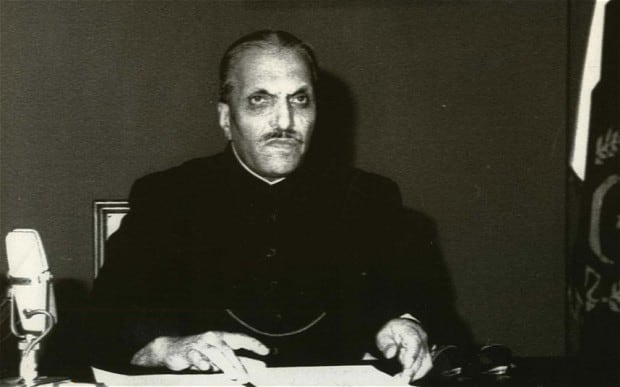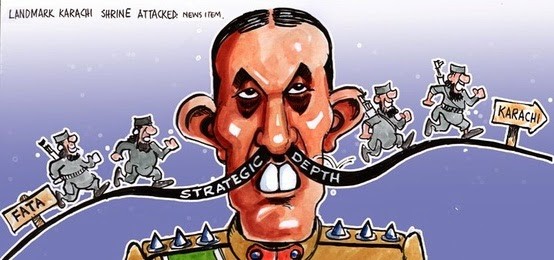A note from Dr Hamid Hussein.
Incidentally, I happen to have heard from a first hand reporter that General Hamid (then chief of army staff) was also involved in the line of people who “forgave” General Zia and thus played a part in giving a specifically Deobandi color to Pakistan’s subsequent Islamization and its associated disasters. As a side note, I think some sort of military takeover and the use of Islam to promote Pakistani nationalism were both going to happen anyway in Pakistan …Islamism is built into Pakistani Nationalism (remember the two-nation theory?) and was promoted in many ways by Bhutto himself; and no political party was likely to overcome the army after Bhutto himself undermined constitutional rule and proper procedures in a thousand different ways … but it is possible to imagine that if a future coup had been mounted by General Jilani or much later, by General Aslam Beg (to pick two random examples, neither necessarily being the most likely actor in any alternative history) they would have used Islam, but would not have been as interested in, say, destroying Pakistani cinema or putting women in purdah or beating up on Ahmedis, as Zia was because of his personal convictions.
Anyway, the story I heard was that General Nawazish (Zia’s superior in Jordan and the person leading the Pakistani military mission) criticized Zia for overstepping his authority and taking direct part in Jordanian military operations, and recommended action against him. This recommendation alone would have sunk his career, irrespective of what action was taken, unless the slate was somehow wiped clean. Zia got Pir Abdullah Shah and General Gul Hassan to help him on the the “mai-baap” frequency (senior officers being begged to help out a junior because he belonged to the same arm or the same unit, no particular personal qualities or links being necessarily critical in such an appeal) and Gul Hassan talked to General Hamid, who then told Yahya to “let the boy off the hook” and removed this blot from his record…. Thus adding a specially painful layer to Pakistan’s future pains.
btw, I wish Dr Hamid had given more details about the actual operations carried out by the Jordanian division commanded by General Zia. What role did he play in an operational sense? How involved was he in actual killing of Palestinian or Syrian forces? was he (God forbid) an effective commander?
Does anyone have any information to add in that respect?
(post script: the Pakistani charge d’affaires in Amman at that time has written a newspaper article in which he also states that General Zia’s role was much exaggerated in later years (he underplays it though, his role was not THAT peripheral, since he did help to hold a critical Jordanian division together, and there was real fighting against the Syrians in Irbid, but I have no doubt that later legends about Zia killing thousands of Palestinians are mostly just legends. by the way, the “istikhara” mentioned here need not be a literal istikhara (recourse to Quran to guess what course to follow) but may be other things, like a signal from the Americans)
Dr Hamid Hussein’s note follows:

June 18, 2014
Someone asked about the veracity of following statement;
“In 1970, when the Hashemite Kingdom of Jordan requested Pakistan’s help in putting down a Palestinian uprising, the Golden Arrow commanded by Brigadier Ziaul Haq restored order.”
I don’t know what is the context of the above statement but it is probably related to the role of Pakistani troops in Jordan’s clash with Palestinian radicals in 1970. Pakistan army’s 7 Infantry Division based in Peshawar is called Golden Arrow. Last several years, a much reinforced 7 Division (much larger than normal division size) is operating against militants in tribal areas. In one short sentence the above statement is incorrect. Unfortunately, in the absence of serious research culture, folklore is passed on as a historical fact in Pakistan. A while ago, I wrote a piece about Pakistan’s security cooperation with Arab states (Pakistan and Arab World: Security Cooperation, Defence Journal, July 2011) and one segment dealt with this particular episode. The relevant segment is attached below that will hopefully clarify few things and give a glimpse of intrigues of byzantine proportions still practiced in the region;
“In 1969, Pakistan sent a military training mission to Jordan. The mission’s primary task was to assess state of Jordanian forces in the aftermath of 1967 defeat at the hands of Israelis and recommend overhaul. Officers from different arms (Infantry, Armor and Artillery) of army and air force were part of this mission. Main objective of the mission was survey of Jordanian armed forces, find deficiencies, recommend solutions and guide in training. Pakistanis got entangled in Jordan’s clash with Palestinians. The simmering tensions between Jordanians and Palestinians resulted in September 1970 showdown when King Hussain ordered Jordanian forces to quell an attempt by Palestinian groups based in Jordan to overthrow the Hashemite kingdom. There were exaggerated reports circulated by Palestinian sympathizers that Pakistani troops helped Jordanian forces in combat. Later, after General Zia-ul Haq’s coup, those opposing him continued these unsubstantiated reports as Zia was in Amman during that time period.
Pakistani training mission consisted of only about two dozen army and air force officers and no combat troops (only exception was an Anti-Air Craft detachment sent in June 1970 at King Hussain’s request as he was worried that Syrian and Iraqi air forces may intervene in support of Palestinians). Pakistan military mission was headed by Major General Nawazish Ali while Air Commodore Anwar Shamim (later Air Chief Marshal and Pakistan air force chief) was in charge of air force officers. During main Jordanian offensive in September, Pakistani ambassador in Amman Nawab Rahat Ali Chattari as well as head of military mission Major General Nawazish were not in the country. Brigadier Zia ul Haq was in charge of the military mission. King Hussain asked Brigadier Zia to take over the command of a Jordanian division. Pakistan’s charge de affairs got approval of this move from Ministry of Defence.
In Amman, 4th Mechanized Division commanded by Brigadier Kasab al-Jazy operated and 60th Armored Brigade of the division commanded by Colonel Alawi Jarrad was at the forefront. After 1967 war, 3rd Iraqi Armored Division had stayed back in Jordan and was deployed in Zarqa. King Hussain was suspicious about the motives of Iraqis and he deployed 99th Brigade commanded by Colonel Khalil Hajhuj of 3rd Jordanian Armored Division near Iraqis to keep them in check. However, young Saddam Hussain emerging from his own recent successful power struggle inside Iraq shrewdly pulled Iraqi troops away from conflict area and finally removed them from Jordan to avoid getting entangled.
2nd Jordanian Infantry Division was based in Irbid near the Syrian border. Palestinian guerrillas had taken control of the town. Syria entered the fray in support of Palestinians by sending 5th Division commanded by Brigadier Ahmed al-Amir. This was a reinforced division consisting of 67th Mechanized, 88th Armored and 91st Armored Brigades of Syrian army and Hittin Brigade consisting of Palestinians. Commanding officer of 2nd Jordanian Infantry Division Brigadier Bahjat al-Muhaisen (he was married to a woman from a prominent Palestinian family) went AWOL and Brigadier Zia took command of the division at the request of King Hussain. 2nd Jordanian Infantry Division was shaky after desertion of Jordanian commander and Zia helped to keep the formation intact. This division helped to take back control of Irbid. Syrian armored thrust near Irbid was tackled by 40th Armored Brigade commanded by Colonel Atallah Ghasib of 3rd Jordanian Armored Division. Major damage to Syrian armor was done by Royal Jordanian Air Force. Inside Syria, a power struggle between Saleh Jadid and Defence Minister and Air Force commander Hafiz al-Asad was at its peak and Asad decided to keep Syrian Air Force out of conflict. In the absence of air cover, Syrian forces were mauled by Jordanian air force and within two days, battered Syrian troops retreated back. Two months later, Asad took control of the affairs of the country sending Jadid to prison. In 1970, Nawazish gave a bad Annual Confidential Report (ACR) to Zia although details of it are not available. It is not clear whether report was written before or after September 1970. Apparently, report was bad enough to possibly end Zia’s career at the rank of Brigadier. Zia asked his former Commanding Officer (CO) of Guides Cavalry Colonel (R) Pir Abdullah Shah for help. Abdullah asked then Chief of General Staff (CGS) Major General Gul Hassan Khan (Zia had also served under Gul Hassan) and report was quashed by army chief General Yahya Khan on Gul’s recommendation.”
Hamid Hussain

